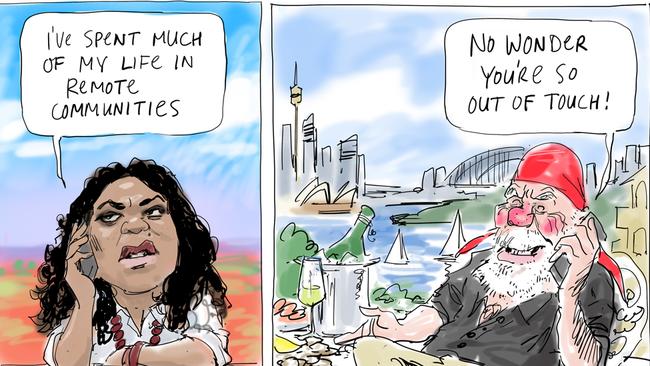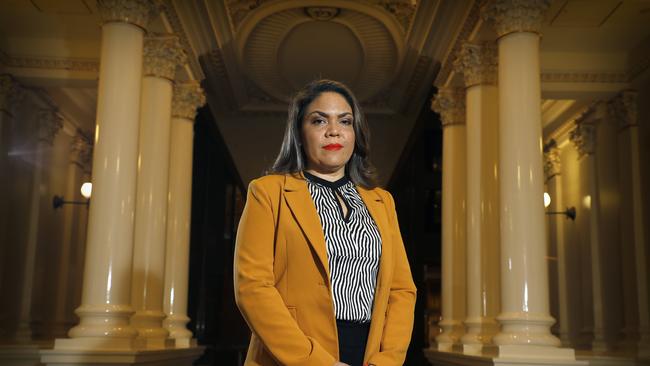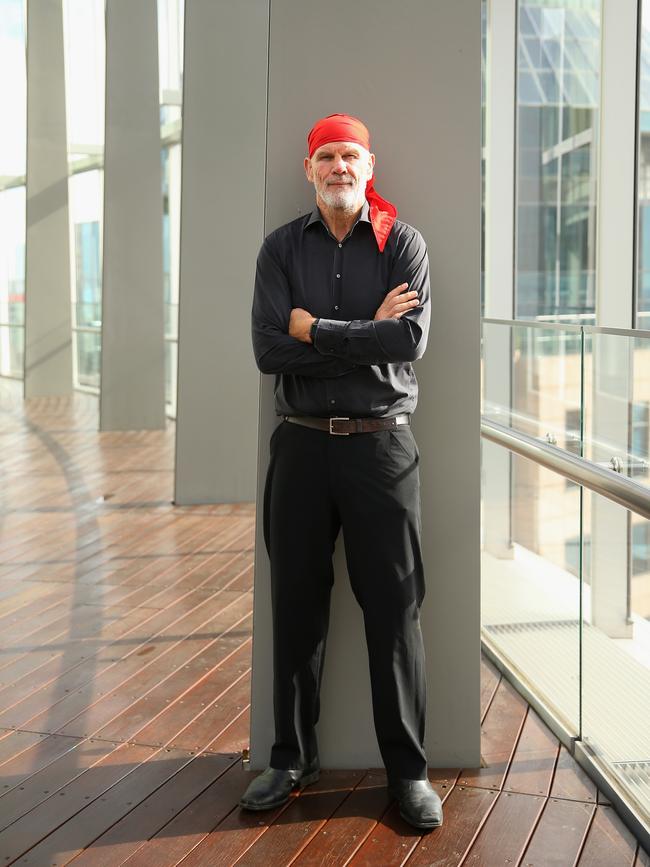Silencing the argument won’t make a voice happen
The imagined moral superiority, arrogance and obscene double standards of the political green left are stripped bare by the Price-FitzSimons drama.

Nobody is perfect. But when we advocate a position, attempting to practise what we preach is always useful.
Exponents of an Indigenous voice to parliament do themselves no favours when they attempt to silence or condemn people with an alternative point of view.
Do they not even conceive of the irony?
They champion a vehicle to give voice to the diverse views of those who previously have been ignored, by attempting to crush dissenting views. Irony be damned, it is rank hypocrisy.
Nowhere has this been more plain than in the public spat between senator Jacinta Nampijinpa Price and The Sydney Morning Herald columnist Peter FitzSimons. And no one has conveyed the core of this issue with more pith than Johannes Leak in his editorial cartoon; he had the Indigenous senator in the outback, explaining how she had spent much of her life in remote communities, while the columnist was at the other end of the line, in his mansion overlooking Sydney Harbour, telling her that this was why she was so out of touch.
A reform that I support – because of the way it presents an opportunity to give voice to the marginalised and erode their marginality – is being put at risk by the arrogance and intolerance of the so-called elites. A voice to parliament succeeds, and is worth doing, only if participants understand that diversity of opinion matters and that respectful disagreement is central to the functioning of democracy at every level.
FitzSimons’s questions to Price as transcribed and published in the SMH were rude and aggressive enough; slurring an Indigenous woman as racially divisive, just because he disagrees with her on a political proposition, when she has only ever campaigned to tackle grassroots dilemmas. We can only imagine how the full one-hour discussion would sound on tape – if FitzSimons and the Herald are comfortable with his performance, they should have no quibble with posting the audio on their site so that all of us can be enlightened by what editor Bevan Shields described as an “interesting” discussion.
Price has asked for the tape to be released but the SMH has resisted. FitzSimons spruiks an Indigenous voice while silencing an Indigenous woman.
Still, that is a sideshow compared with the central point revealed by this episode. The imagined moral superiority, arrogance and obscene double standards of the political green left are stripped bare.
These same tendencies drive the cancel culture mentality of our universities, media and politics across a range of areas such as climate and immigration. They metastasise aggressively around identity politics.
The assertion is that if you fail to see racism around you every day, have been supported by alleged racists, benefited from the racist attitude of your ancestors, failed to proclaim publicly your antipathy towards racism, skipped a smoking ceremony, scoffed at a welcome to country, neglected to make an acknowledgment of country or been ambivalent about an Indigenous voice to parliament, then you are a fair target. This is the new tick-a-box attitude to identity issues that allows the woke to signal their virtue and denounce or silence others.

It is a cancerous blight on public debate imported from the US. Prevalent at the public broadcasters, Guardian Australia, the Nine Entertainment newspapers and Channel 10, this mindless submission to political fashion is best personified by the would-be president of the People’s Republic of Australia, FitzSimons, and his wife, the queen of tabloid television, Lisa Wilkinson.
A criminal trial for an alleged rape in Parliament House, the personal insights of an Indigenous senator, a politician’s concerns about girls competing against biological males, or the Christian faith of Pasifika footballers – this pair stumbles, guns slinging, into every identity controversy.
What is revealed is that no person’s rights or opinions trump their need to pontificate about their woke ideals.
They do not seem to understand how this railroading of public debate damages the causes they claim to hold dear. Constantly haranguing people, forcing guilt trips and presuming to tell others what to think and feel is a sure-fire way to generate resistance.
The republic is another issue on which I share a constitutional goal with FitzSimons. But I tend to agree with my monarchist friends that he is their greatest asset.
On Indigenous issues, welcomes to and acknowledgments of country have become the new battleground between the woke and the wise. We could presume that Fitzy and Lisa offer one every morning when they rise to see the sun glimmering on the Gadigal and Cammeraygal waters of Sydney Harbour.
This week we noticed these deferential statements towards Indigenous people, cultures and rights have made their way on to our supermarket receipts and into the opening credits of reality television programs, as well as inveigling their way into almost every sporting, educational, public service and business event. No doubt FitzSimons would disagree with Price on this issue too because she says the ceremonies often are overdone, cringe-worthy and amount to a “lip service” that can be divisive.

Many people agree. What can be apt and unifying recitals are being transformed into an all-pervasive, blunt, social engineering instrument that, before too long, could be ignored as a tokenistic routine.
We are left to wonder whether these pushes will damage the causes their purveyors would claim to support. People do not like their thoughts to be marshalled by anyone, including political leaders, corporations, educational institutions and most media – remember the republic referendum.
These tensions will not disappear in a hurry and they prompt the question of whether an Indigenous voice can be delivered if, along the way, the debate demonstrates we are incapable of tolerating disagreement.
What is the point of a voice if we are all supposed to agree anyway?
For someone like me, who has developed a largely conservative political outlook, it is excruciating to be on the same side as the so-called progressives on a couple of issues. Superficially it is testing because when you see the antics of people such as FitzSimons and the ABC barrackers you are tempted to disassociate from the cause as they define it; but more insightfully, you see how so-called progressives eschew rational arguments in favour of lazy emotionalism and fashion.
Which is why, on the republic, they refuse to engage in a debate about how a democratic system based on merit should have at its pinnacle a product of democracy and merit; instead, they go with the jingoistic notion that our head of state should be “one of us” (xenophobic enough?).
Likewise on the voice, instead of addressing the decades-old debates about representation and constitutional recognition, and the impact it could have on practical reconciliation and redressing disadvantage, they prefer to run with emotive arguments such as claims by University of Technology Sydney professor Nareen Young that the “only people asking for detail are people who oppose it” and that the voice is being undermined by Coalition “rednecks and racists”.
News flash – such abuse will not persuade undecided voters to support your side, nor will it help to develop a bipartisan consensus. In fact, it is wind in the sails of conservative opponents such as my colleague Andrew Bolt, who has invoked the divisiveness of apartheid.
Bolt, by way of contrast, was happy to engage in a respectful debate with me on the issue. And more detail, including a draft bill, will be necessary.
We should not pretend that this is easy or all about emotion and empathy.
Any intelligent proponent must understand the justifiable sensitivities about constitutional reform, reticence about constructing new representative bodies, and the cautionary experience of the Aboriginal and Torres Strait Islander Commission.
Intelligent arguments must explain that this is a constitutionally conservative way of delivering a practical outcome, along with constitutional recognition for Indigenous Australians. It avoids the limited bill of rights implicit in a racial non-discrimination clause, or the consoling but constitutionally risky symbolism of a revised preamble, offering instead the right to offer advice when the government exercises its constitutional power to make laws about Indigenous people.
When the nation voted overwhelmingly to give that power to the federal government in 1967, it would have been uncontroversial to include an obligation to accept representations from an Indigenous representative body, subordinate to the parliament. We can bolt it on now in a practical act of reconciliation.
It is not a slogan, it is not a fait accompli, it is not an emotive free kick.
It is a substantive and calculated reform that, if constructed and operated wisely, can deliver real outcomes in closing the gap and embedding in the Constitution the only people who were, initially, specifically excluded.




A bunch of us were lined up in the dark of night on a school camp near the Coorong in the 1970s, teenagers caught with cigarettes, as a teacher paced up and down haranguing us. His gesticulations and passionate lecturing about the evils of cigarettes were interrupted intermittently as he lifted a glowing Marlboro to his angry lips.